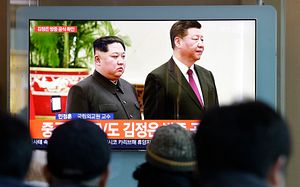China and North Korea have a special relationship. It was China that helped Kim Il Sung with a “volunteer army” of more than a million soldiers at a critical stage during the Korean War. Mao Zedong lost his eldest son in that war. In fact, even before that, North Korea had provided China with assistance. During the civil war with the Kuomintang, the Chinese Communist Party received military support from Kim Il Sung. Because of these historical events, the relationship between the countries has been described as a “blood” alliance.
Although this year the two countries are marking 70 years of friendly relations, ties have not always been entirely amicable. There have been times when the relationship has cooled dramatically, for instance during the Cultural Revolution or immediately after the normalization of relations between China and South Korea. When China opposed North Korea’s missile and nuclear program and decided to impose economic sanctions, relations between the two countries deteriorated to such an extent that the official newspaper of the Workers’ Party of Korea abused China by name.
Just as the breach looked irreparable, in March last year Kim Jong Un made a sudden visit to China, and the relationship took a dramatic turn for the better. Then from January 7 to January 10 this year, Kim Jong Un made his fourth visit to China; that despite the fact that Xi Jinping has never once visited Pyongyang.
While on the surface ties between the two countries now seem amicable, public sentiment in the two countries is complex. They are both nominally communist countries, yet there is a deep-rooted mutual suspicion. In China, there is a view that North Koreans are a troublesome lot who never do what they are told despite having received support for many years. From the North Korean perspective, they do not like China’s superpower-like attitude and wonder why Beijing expects Pyongyang to abandon nuclear weapons when China has the same weapons itself. What’s more, they wonder why China used sanctions to put pressure on North Korea, despite them being allies.
When the two countries’ leaders shake hands and smile, this is a strategy. Right now, North Korea needs to engage in “tributary diplomacy” towards China. Its aim is to push forward the stalled relationship between the United States and North Korea.
During his New Year’s address to the North Korean people, for the first time Kim Jong Un referred to denuclearization in his own words and reaffirmed his intent to focus on building up the North Korean economy. If he is not able to bring about the lifting of sanctions, however, he cannot expect high economic growth. Despite ago managing to set up the first ever leaders’ summit between the United States and North Korea in the middle of last year, sanctions have not been lifted. In fact, they have strengthened. Japan and the United States are angry that North Korea has not implemented denuclearization, despite undertaking to do so. North Korea is becoming increasingly suspicious of how the United States has promised to build a new relationship and yet had not changed its hostile policies towards the country.
It has been revealed that during the recent China-North Korea summit, the leaders discussed denuclearization and U.S.-North Korea talks. Kim Jong Un’s visits to China last year took place just after Trump gave the green light for talks with Kim and around the time of the U.S.-North Korea leaders’ summit. On the basis of this precedent, we might expect North Korea to hold restarted talks with the United States before March.
In his New Year’s greetings, Kim showed a North Korean flag for the first time, and a new phrase, “supreme interests of the state,” appeared. While there was a significant increase in references to peace, there was a dramatic decrease in references to unification. Although North Korea has put forward a plan for “federal unification” since 1980, Kim has started to say that it will look for a new unification plan. Right now, North Korea is not aiming for unification; rather, it seeks to maintain its current regime and establish separation. To that end, it has promised Moon Jae-in peaceful coexistence. While Kim emphasizes the existence of an independent country in the northern half of the Korean peninsula, there is probably no reason why he cannot appear at the General Assembly of the United Nations. Possibly, he supposes that they could reach some concrete agreement at the second U.S.-North Korea summit, then hold a third September summit in New York to follow up on implementation by both sides.
Unfortunately, there is hardly anyone in North Korea to whom Kim can turn for honest advice. It may be precisely because he is seriously considering U.S.-North Korea relations that he has decided that he has no choice but to engage in tributary democracy with his “mentor” Xi Jinping. Meanwhile, as a player in the denuclearization process, China is motivated to become involved. By Xi himself celebrating Kim’s January 8 birthday, it seems that China is drawing North Korea close and making sure that it does not backtrack on its road to nuclearization.
Atsuhito Isozaki is an Associate Professor at Keio University.

































